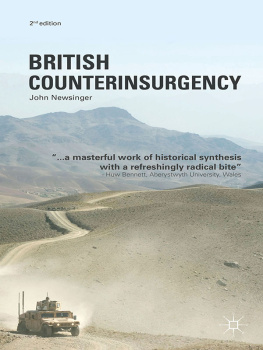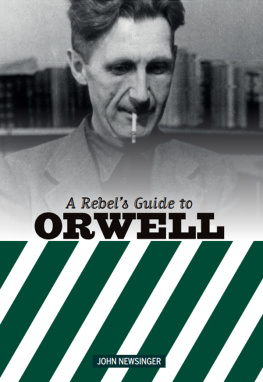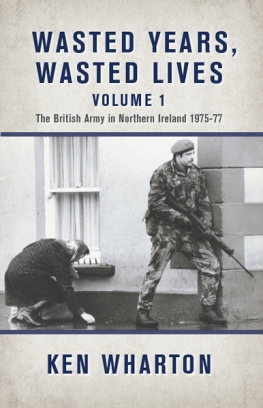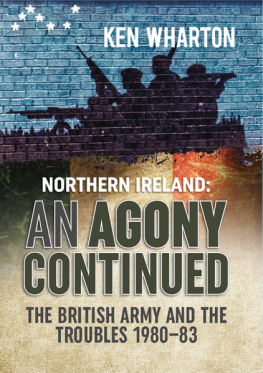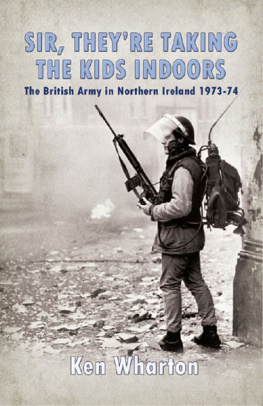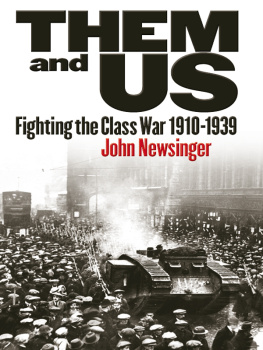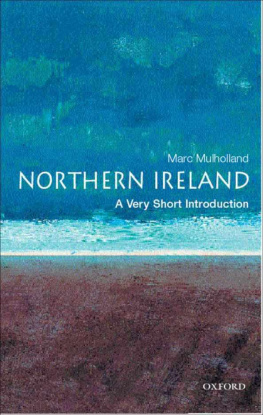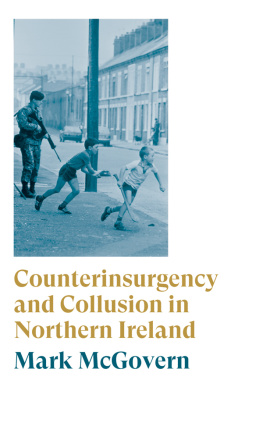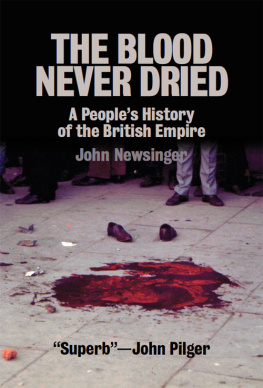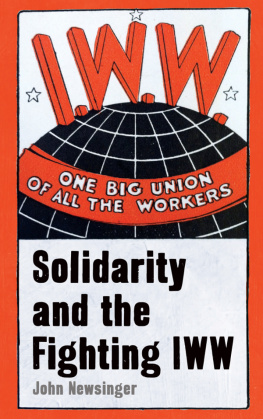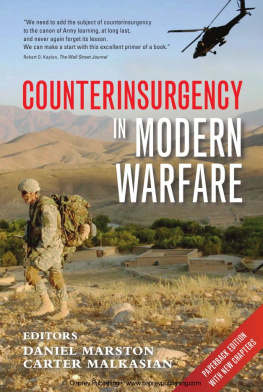Newsinger - British counterinsurgency: from Palestine to Northern Ireland
Here you can read online Newsinger - British counterinsurgency: from Palestine to Northern Ireland full text of the book (entire story) in english for free. Download pdf and epub, get meaning, cover and reviews about this ebook. City: Basingstoke;Hampshire, year: 2015, publisher: Palgrave Macmillan, genre: Religion. Description of the work, (preface) as well as reviews are available. Best literature library LitArk.com created for fans of good reading and offers a wide selection of genres:
Romance novel
Science fiction
Adventure
Detective
Science
History
Home and family
Prose
Art
Politics
Computer
Non-fiction
Religion
Business
Children
Humor
Choose a favorite category and find really read worthwhile books. Enjoy immersion in the world of imagination, feel the emotions of the characters or learn something new for yourself, make an fascinating discovery.
British counterinsurgency: from Palestine to Northern Ireland: summary, description and annotation
We offer to read an annotation, description, summary or preface (depends on what the author of the book "British counterinsurgency: from Palestine to Northern Ireland" wrote himself). If you haven't found the necessary information about the book — write in the comments, we will try to find it.
Newsinger: author's other books
Who wrote British counterinsurgency: from Palestine to Northern Ireland? Find out the surname, the name of the author of the book and a list of all author's works by series.
British counterinsurgency: from Palestine to Northern Ireland — read online for free the complete book (whole text) full work
Below is the text of the book, divided by pages. System saving the place of the last page read, allows you to conveniently read the book "British counterinsurgency: from Palestine to Northern Ireland" online for free, without having to search again every time where you left off. Put a bookmark, and you can go to the page where you finished reading at any time.
Font size:
Interval:
Bookmark:
British Counterinsurgency
British Counterinsurgency
2nd Edition
John Newsinger


John Newsinger 2015
All rights reserved. No reproduction, copy or transmission of this publication may be made without written permission.
No portion of this publication may be reproduced, copied or transmitted save with written permission or in accordance with the provisions of the Copyright, Designs and Patents Act 1988, or under the terms of any licence permitting limited copying issued by the Copyright Licensing Agency, Saffron House, 610 Kirby Street, London EC1N 8TS.
Any person who does any unauthorized act in relation to this publication may be liable to criminal prosecution and civil claims for damages.
The author has asserted his right to be identified as the author of this work in accordance with the Copyright, Designs and Patents Act 1988.
First published 2015 by
PALGRAVE MACMILLAN
Palgrave Macmillan in the UK is an imprint of Macmillan Publishers Limited, registered in England, company number 785998, of Houndmills, Basingstoke, Hampshire RG21 6XS.
Palgrave Macmillan in the US is a division of St Martins Press LLC, 175 Fifth Avenue, New York, NY 10010.
Palgrave Macmillan is the global academic imprint of the above companies and has companies and representatives throughout the world.
Palgrave and Macmillan are registered trademarks in the United States, the United Kingdom, Europe and other countries.
ISBN: 9780230298231 ISBN: 9780230298248
This book is printed on paper suitable for recycling and made from fully managed and sustained forest sources. Logging, pulping and manufacturing processes are expected to conform to the environmental regulations of the country of origin.
A catalogue record for this book is available from the British Library.
A catalog record for this book is available from the Library of Congress.
To Jack Newsinger (192182) and Mary Newsinger (19252015)
Contents
Introduction to the 2nd Edition
When this book was first published in 2002, the Introduction commented on how the major counterinsurgency campaigns that the British state had waged in Palestine, Malaya, Kenya, Cyprus, South Yemen, Dhofar and Northern Ireland since 1945 had produced a largely celebratory literature. The general argument of this literature was that Britains campaigns had been conducted with considerable success. This contrasted with the French experience in Indo-China and Algeria, with the Dutch in Indonesia, with the Portuguese in Angola, Mozambique and Guinea-Bissau, with the Americans in Vietnam and with the Russians in Afghanistan. The British, it was argued, knew how to conduct counterinsurgency campaigns and, moreover, conducted them without bringing dishonour on their cause through the use of massacre and torture. This was a distortion of the historical record. First of all, the post-war record included important defeats in Palestine and South Yemen, and included the British failure, despite overwhelming numerical and material superiority, to successfully destroy their opponents in Cyprus and Northern Ireland.
Another important point was that starting with the Labour government of 194551, the British took the decision to withdraw rather than confront full-scale rebellion and insurgency in any large, heavily populated Imperial territory. The decision to withdraw from India and Burma, for example, saved the British Empire from its Algeria, from its Vietnam, from its Afghanistan. If the Conservative Party had been returned to power in 1945, there is every likelihood that it would have provoked revolutionary war in India and Burma on a scale that would have completely dwarfed any of the colonial wars that actually did take place post-1945. These wars would certainly have ended in costly defeats. Moreover, the scale of the fighting would have inevitably ensured that they were accompanied by a level of atrocity such as that associated with the French war in Algeria and the American war in Vietnam. The British reputation for comparative restraint would have never taken off. The emphasis here is very much on the word comparative. The claim that the British waged counterinsurgency operations humanely, always practising the minimum use of force and seeking to win hearts and minds, was always a myth. But it was a myth that was given legs by the small scale of the wars that the British chose to fight, the weakness of their opponents and the corresponding low level of British casualties. Nevertheless, where necessary, considerable force was used, sometimes successfully, sometimes not; moreover, the war in Kenya, it is by now generally acknowledged, was conducted with a terrible severity by any standard, certainly comparable with the worst excesses of the French in Algeria or of the Americans in Vietnam. Indeed, a good case can be made that minimum force was generally interpreted by the British as allowing as much force as was considered necessary.
Success, partial success or failure in British counterinsurgency campaigning was not dependent on any supposed military superiority in waging these campaigns, but rather on the ability to establish a large enough political base among sections of the local population so as to enlist their support and assistance in the defeat of the insurgents. Put crudely, but nevertheless accurately, divide and rule remained the key to success in the wars that accompanied the end of the British Empire. The point is also worth making that Britains post-war counterinsurgency campaigns took place in a context of Imperial retreat, of admittedly often reluctant decolonisation but nevertheless still decolonisation.
It seems fair to say that when BritishCounterinsurgency was first published, the critical stance it took towards the post-1945 campaigns was very much a minority stance. This is no longer the case. Indeed, there is a new consensus today, one that is openly dismissive of the notion that the British were humane counterinsurgents practising minimum force, winning hearts and minds, or particularly successful. Instead, coercion has moved centre stage. As David French put it: The cornerstones of most British counter-insurgency campaigns were coercion and counter-terror, not kindness and economic development ... waging counter-insurgency operations by employing coercion and intimidation continued to be a mainstay of British practice after 1945.
What is also important, however, is to acknowledge the context within which this new consensus has emerged, a context that facilitated it and gave it more than academic credibility. Whereas the British counterinsurgency campaigns in Palestine, Malaya, Kenya, Cyprus and South Yemen could all be seen as fighting retreats, Tony Blairs New Labour government took the decision to effectively hand the British Army over to the United States for deployment in the American wars of aggression in Afghanistan and Iraq. These were conflicts that no post-war British government would have participated in of its own volition. However, in order to further the so-called special relationship, the British government committed British troops to fight alongside the Americans in the War on Terror, an ideological construct intended to justify military action against governments the US regarded as threatening its interests. The British government and the British military wilfully surrendered their strategic judgement to the most incompetent post-war US administration led by the worst post-war President; indeed, many would say this involved one of the most incompetent US administrations ever and arguably the worst President ever.
Next pageFont size:
Interval:
Bookmark:
Similar books «British counterinsurgency: from Palestine to Northern Ireland»
Look at similar books to British counterinsurgency: from Palestine to Northern Ireland. We have selected literature similar in name and meaning in the hope of providing readers with more options to find new, interesting, not yet read works.
Discussion, reviews of the book British counterinsurgency: from Palestine to Northern Ireland and just readers' own opinions. Leave your comments, write what you think about the work, its meaning or the main characters. Specify what exactly you liked and what you didn't like, and why you think so.

